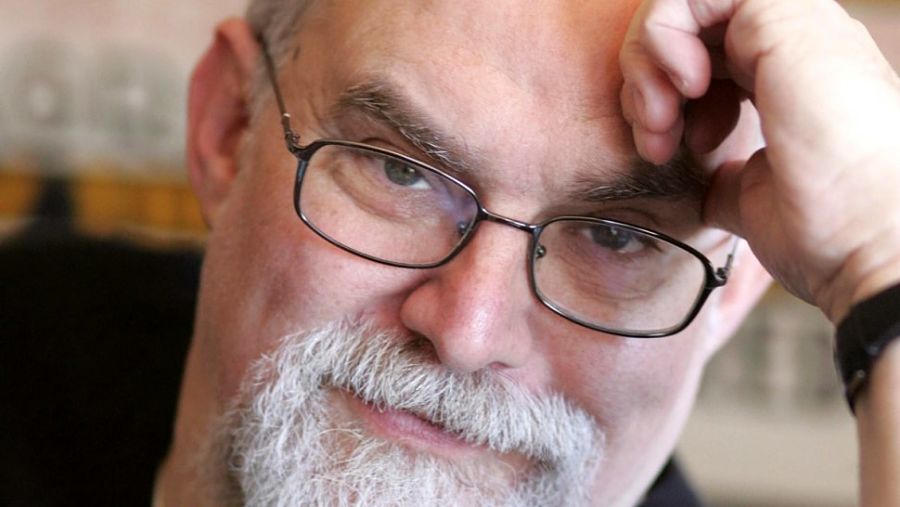Composer and lyricist William Finn, whose musicals included March of the Falsettos, A New Brain, and The 25th Annual Putnam County Spelling Bee, died on April 7. He was 73. For another tribute to him, go here.
William Finn left lyrics everywhere—in margins, scrawled diagonally across the back of script pages, in and out of binders. He could never find the one he wanted. “This isn’t it. The real one is much better.”
He preferred a relaxed working environment. “Do you do your best work when you’re trying to squeeze it out, or when you’re having fun?” he’d ask. Then he’d order lunch. You can hear many stories of people driving to the Berkshires for a meeting with Bill to end up sitting watching Project Runway with him.
Bill trusted his process, his instincts, his taste. “I have a nose,” he’d say. He’d say that about the art displayed on every wall of his house, from a penciled tapir to a painting of Honey Boo Boo—a throughline of virtuosity and irreverence. And he’d say it about collaborators, proud of his ability to “sniff out” talent. Undeniably, the list of his early arrangers, assistants, music directors, actors is full of people who became theatre luminaries.
Bill loomed large in many lives: large in presence, large in voice, large in impact. For me, seeing a college production of March of the Falsettos was revelatory: Oh, musicals can be personal and idiosyncratic! They can handle the contemporary and the complex. They can be giddy with the pleasure of performance while aiming at something essential.
I was in Bill’s presence many times when fans would come up to tell him how much Falsettos or A New Brain or Spelling Bee meant in their lives, which he would characteristically answer with, “Well, whatever,” as he soaked it up. He could let you know he was pleased and downplay it at the same time.
He found charm in a studied casualness, in both his lyrics and person. A wardrobe full of black T-shirts and lyrics of insouciance, a delight in the conversational, the particular. He loved internal rhyme, loved pleasing his own ear. If this sometimes involved making up words for the rhyme, that was part of the pleasure. Sometimes the silliness was a Trojan horse for emotion. His writing appears stream-of-consciousness, and in part it is, but it is also, as he liked to point out, rigorously shaped. I find it informative to read Finn’s lyrics alongside poetry—think of Frank O’Hara, or Whitman crossed with Ogden Nash. He knew what kind of voice he wanted to bring into the theatre.
And he was motivated by music. He loved big musical theatre voices and writing for them. It was a treat to hear him sit at the piano playing first drafts of songs, not a light touch on the keys, singing in a gravelly voice, then switching to a howling falsetto, stretching out the vowels.
Bill was the first to admit he wasn’t always easy. It could be hard to get him to change things—only James Lapine could, and sometimes not even James Lapine could. There are 20 years of students at NYU whose lives Bill transformed with his attention–and others who dropped his class, put off by his unabashed, opinionated style. He never pretended to teach anyone else’s aesthetic. He was less likely to give detailed critique than to say, “This one isn’t good, write another.” Where colleagues might labor over multi-page assignments, Bill would come in and say, “Write about February,” or “Write about a sandwich,” and elicit the best work of the year.
At a tribute to Finn at Barrington Stage, I once said that he treated me always with great generosity and disdain. He approved that message. Working together on …Spelling Bee, Bill excelled at not getting distracted by ideas that didn’t inspire him and responding with enthusiasm to ones that did. Later I came to trust what I called his genius of inattention. If he got distracted or nodded off while I was explaining an idea, it was the wrong direction.
Bill loved to be entertained—would ask time and again to hear people’s personal stories. Maybe that’s also why he loved reality TV. If it’s a genre famous for the manipulation of truth, that echoed his approach: Find entertainment in truth, find truth in entertainment.
Last year Bill debuted a song cycle with music by Danny Ursetti, paralleling his experience with the pandemic: “I had a stroke in September./Not a bad one./Not a good one./The quarantine started—/I don’t remember…/ But around March.”
The cycle also includes an understated love song to Arthur Salvadore, Bill’s devoted partner of 45 years: “I guess we get along.”
You can’t understand Bill without celebrating Arthur, as Bill’s best songs often do. That includes the gorgeous “I’d rather be sailing” from A New Brain:
I’d rather be sailing
Yes, I’d wanna go sail
And then come home to you
Note that parenthetical affirmative. You can hear it in other Finn songs (“yes I do, yes I do, yes I do”). He was always aiming for the positive, couched in the negative, or brought it in through perspectives ostensibly not his own. This way he could maintain a gruff exterior while channeling characters to teach that “Li-i-i-i-i-i-ife has infinite joy.”
Rachel Sheinkin is a playwright, lyricist and Tony-winning librettist for musical theatre. She worked with William Finn on The 25th Annual Putnam County Spelling Bee and The Royal Family of Broadway.
Support American Theatre: a just and thriving theatre ecology begins with information for all. Please join us in this mission by joining TCG, which entitles you to copies of our quarterly print magazine and helps support a long legacy of quality nonprofit arts journalism.
Related

How William Finn Spelled Family
An original collaborator on ‘The 25th Annual Spelling Bee’ recalls its intense creation and the generous spirits that blessed it.
In "In Memoriam"

Ride or Die for Mental Health
How a tour of Rocky Mountain theatres allowed one group of bikers to raise awareness for Behind the Scenes Charity.
In "Fall 2024"

Theatrical Mustang: Vera Drew Is ‘The People’s Joker’
This month, Woodzick chats with multi-hyphenate filmmaker Vera Drew about cultivating joyful spaces for trans audiences through her DIY film 'The People’s Joker.'
In "Features"




